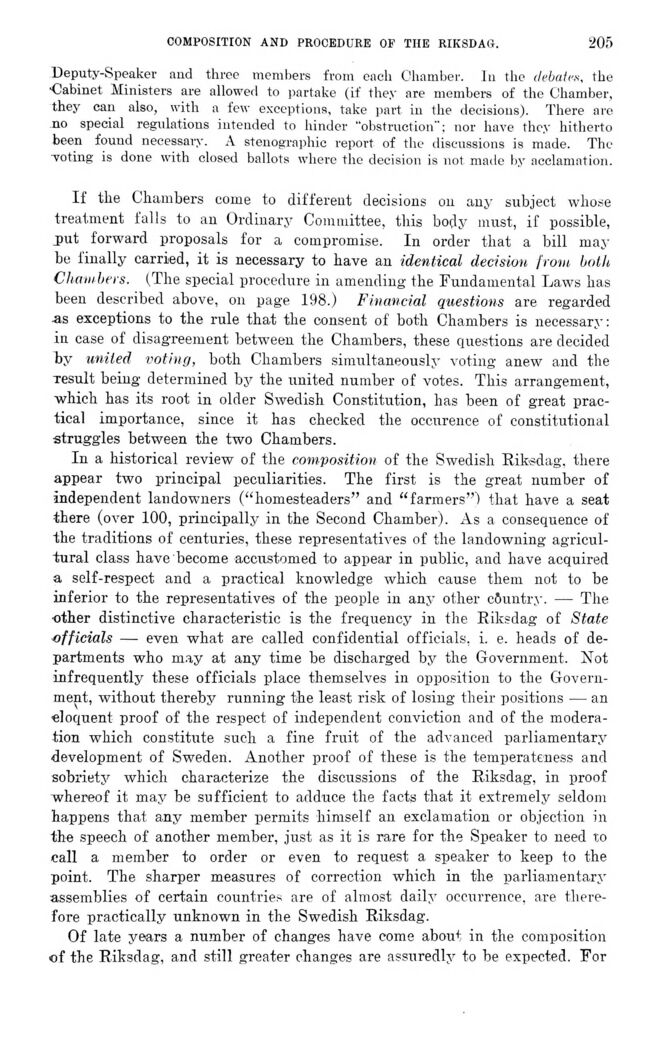
Full resolution (JPEG) - On this page / på denna sida - III. Constitution and Administration. Introd. by E. Hildebrand - 1. Constitution. By E. Hildebrand - Composition and Procedure of the Riksdag. By [J. P. Velander] T. Hedrén

<< prev. page << föreg. sida << >> nästa sida >> next page >>
Below is the raw OCR text
from the above scanned image.
Do you see an error? Proofread the page now!
Här nedan syns maskintolkade texten från faksimilbilden ovan.
Ser du något fel? Korrekturläs sidan nu!
This page has never been proofread. / Denna sida har aldrig korrekturlästs.
COMPOSITION AND PROCEDURE OF THE RIKSDAG.
205
Deputy-Speaker and three members from each Chamber. In the debate*, the
•Cabinet Ministers are allowed to partake (if they are members of the Chamber,
they can also, with a few exceptions, take part in the decisions). There äro
no special regulations intended to hinder "obstruction"; nor have they hitherto
been found necessary. A stenographic report of the discussions is made. The
voting is done with closed ballots where the decision is not made by acclamation.
If the Chambers come to different decisions 011 any subject whose
treatment falls to an Ordinary Committee, this body must, if possible,
jut forward proposals for a compromise. In order that a bill may
be finally carried, it is necessary to have an identical decision from- bolk
Chambers. (The special procedure in amending the Fundamental Laws has
been described above, 011 page 198.) Financial questions are regarded
as exceptions to the rule that the consent of both Chambers is necessary:
in case of disagreement between the Chambers, these questions are decided
by united voting, both Chambers simultaneously voting anew and the
Tesult being determined by the united number of votes. This arrangement,
which has its root in older Swedish Constitution, lias been of great
practical importance, since it has checked the occurence of constitutional
struggles between the two Chambers.
In a historical review of the composition of the Swedish Riksdag, there
appear two principal peculiarities. The first is the great number of
independent landowners ("homesteaders" and "farmers") that have a seat
there (over 100, principally in the Second Chamber). As a consequence of
the traditions of centuries, these representatives of the landowning
agricultural class have become accustomed to appear in public, and have acquired
a self-respect and a practical knowledge which cause them not to be
inferior to the representatives of the people in any other cöuntry. — The
•other distinctive characteristic is the frequency in the Riksdag of State
officials — even what are called confidential officials, i. e. heads of
departments who may at any time be discharged by the Government. Not
infrequently these officials place themselves in opposition to the
Government, without thereby running the least risk of losing their positions — an
eloquent proof of the respect of independent conviction and of the
moderation which constitute such a fine fruit of the advanced parliamentary
development of Sweden. Another proof of these is the temperateness and
sobriety which characterize the discussions of the Riksdag, in proof
whereof it may be sufficient to adduce the facts that it extremely seldom
happens that any member permits himself an exclamation or objection in
the speech of another member, just as it is rare for the Speaker to need to
call a member to order or even to request a speaker to keep to the
point. The sharper measures of correction which in the parliamentary
assemblies of certain countries are of almost daily occurrence, are
therefore practically unknown in the Swedish Riksdag.
Of låte years a number of changes have come abou+ in the composition
of the Riksdag, and still greater changes are assuredly to be expected. For
<< prev. page << föreg. sida << >> nästa sida >> next page >>